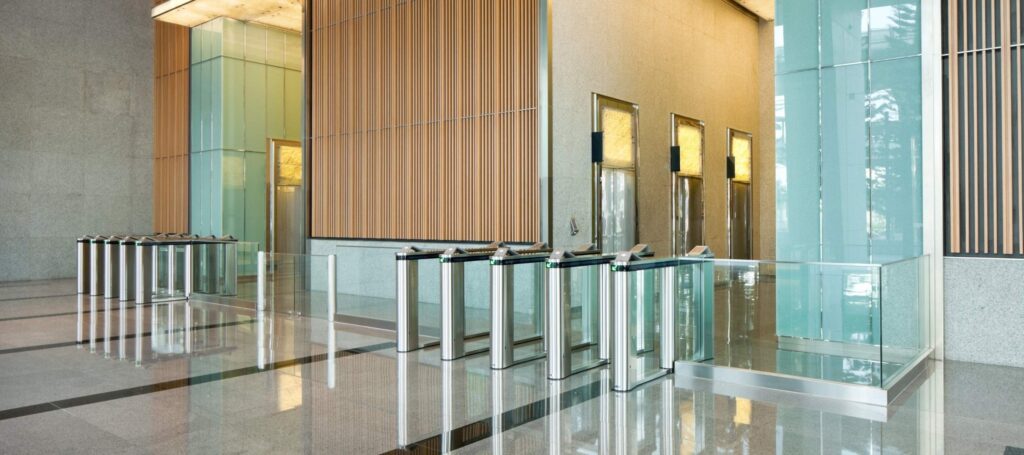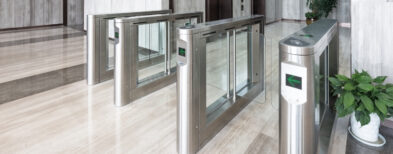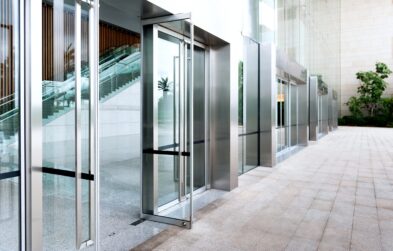As a business owner or security professional, finding the right access control system is important. You want to protect your assets, employees and customers. But with so many options available, it can be overwhelming to know where to start – especially when it comes to access control system cost.
The truth is, there is no one-size-fits-all answer. However, in this article, we’ll explore the factors that influence the cost of access control and provide a better understanding of what fees to expect. From your initial investment to ongoing maintenance, we’ll break down the costs associated with installing a new electronic access control system and help you make an informed decision about the best system for your needs and budget. So, grab a cup of coffee and let’s begin.
In this article, we’ll discuss:
- Access Control System Cost
- What Types of Access Control Systems Are There?
- Hidden Costs of Access Control Features
- Choosing a Credential Type
- Integrations: Video Surveillance and More
- Other Costs of Access Control Systems
Access Control System Cost: Don’t Believe Your Eyes!
There’s a lot of poorly vetted information on the internet when it comes to access control pricing. Unfortunately, most information won’t help you get a much clearer idea of the true price. In fact, Googling “average cost of an access control system” often yields results ranging from $500 to $3,500 per door.
Confused by the price range? So are we.
Most, if not all, access control companies will avoid publishing their prices online in order to remain competitive in the marketplace. However, some well-known access control providers will write broadly about pricing, like this:
| Door Reader and Hardware | $600-$1,200 per door |
| Installation w/o locks | $1,200-$2,500 per door |
| Basic door license | $600 per year, per door |
Again, this information isn’t worth its weight (i.e., nothing). Why? Many additional factors come into play when pricing out a new system. Some of these factors include:
- Software features
- API integration fees
- Credential fees
- System maintenance and upkeep
- Installation
- Number of Users
We’ll elaborate on each of these points in this article, but the bottom line is: When you see an exact dollar figure online for an access control system, be wary.
What Types of Access Control Systems Are There?
Access Control – Cloud vs. On-premises
One of the first decisions you’ll need to make is which type of access control system. Electronic access control comes in two forms: on-premises and cloud-based. These are the basic access control systems. On-premises access control requires servers to be housed on site, whereas cloud-based systems are managed off site by a third party.
When it comes to cost, on-premises systems come with an added price tag. Regular maintenance is necessary, as are manual updates and integrations. Conversely, since cloud-based access control systems are managed off site, the user is not responsible for managing the upkeep of the servers. This can help teams automate their processes and concentrate on more important tasks.
Additionally, cloud-based access control offers a remote option, allowing teams remote access to their systems. In many cases, cloud-based access control can end up being a more affordable and robust option, without the continual costs of an on-prem system.
Common Types of Access Control Systems
After deciding whether to select an on-premises or cloud-based solution, you will have to choose the appropriate credential form. Credentials interact with hardware, like door proximity readers, to authenticate preprogrammed access permissions. In other words, credentials hold the information that lets you through the door to your office.
A wide range of choices exist when it comes to credentials for physical access control. Types of access control credentials, include:
- Mobile Access Control
- Employee Badge in Apple Wallet
- Key cards or Key Fobs
- Keypad Access Control
- Biometric Access Control
These access control types are discussed in greater detail, below.
- Mobile access: Mobile access control systems use smartphones, smart devices and tablets as people’s keys. Due to its convenience, mobile access control is gaining popularity among enterprises, commercial real estate and schools. These are slowly replacing card access control systems.
- Employee Badge in Apple Wallet: iPhone and Apple Watch users can store digital copies of their employee badge, credit cards, driver’s license and more in Apple Wallet. While Genea offers an integration with Employee Badge in Apple Wallet, many cloud-based access control companies do not. Employee Badge in Apple Wallet offers a secure and convenient way to distribute user credentials. To learn more about how organizations are finding this integration useful, read our Jamf case study.
- Key cards/key fobs: Key cards and key fob access control systems are most widely used. You can find these in enterprises, hospitals, schools and more. Key card access control systems use swipe or proximity cards to authenticate access. They offer enhanced security and flexibility over traditional keys.
- Keypads: A keypad access control system is a security solution that requires users to enter a unique code on a keypad to gain access to a restricted area. These are integrated with access control software to regulate door access control systems. Keypads and smart locks are beneficial because they negate the need for employees or tenants to carry physical keys.
- Biometrics: Biometric access control uses unique physical traits of an individual for identification. For example, fingerprints, facial recognition and iris scans are used to grant access to a restricted area or device. This type of system is designed to prevent unauthorized access by ensuring that only authorized individuals with verified biometric credentials can gain entry. Biometric access control is widely used in high-security areas such as government buildings, financial institutions, and research facilities, as well as in everyday applications such as unlocking smartphones and laptops.
Some providers offer compatibility with more than one form of access control. Genea Security gives IT and security teams the ability to choose mobile, Apple Watch, key card or key fob access control.
Additionally, those looking for two-factor (2FA) or multi-factor authentication can boost their security by using different forms. For example, a government agency might use key cards and a biometric fingerprint to prevent unauthorized access.
When it comes to selecting the right credential type, pricing should also be considered. Certain providers will charge per user, others will not.
Hidden Costs of Access Control Software Features
Software features vary tremendously when it comes to physical access control. However, some of the basic requirements should include automated reporting and provisioning, intuitive dashboards and equipment status alerts. Without these features, you’re sure to encounter problems in the long run. Make sure to thoroughly compare what you’re getting and, if possible, ask for a comparative breakdown of the features offered.
- Automated Reporting: Automated reporting offers insight into user activity, system usage and security incidents. Reports can be customized to provide a summary of the data needed, and they can be scheduled to run automatically on a regular basis. These reports provide valuable data to help identify areas for improvement, identify security vulnerabilities, and demonstrate compliance with regulatory standards.
- Intuitive Dashboards: The software dashboard should provide a user-friendly interface for managing access control. Administrators can view and control access levels for each user, assign access credentials and monitor activity in real-time. The dashboard should be customizable, allowing administrators to tailor it to their needs and preferences.
- Equipment Status Alerts: Equipment status alerts refer to real-time notifications and alerts that indicate the operational status of access control equipment. This information can include equipment malfunction, maintenance, firmware updates and other critical information that may impact the security of a building or facility. By receiving these updates in real-time, security personnel can quickly identify and address any issues to ensure the access control system remains functional and secure.
Again, access control software features vary by provider. Some providers offer features as add-ons, which increase the price of an access control installation. To see Genea’s robust set of access control features, click here.
Integrations: Video Surveillance, Visitor Management and More
Access control system costs also depend on the API integrations required by your organization. Different types of security systems require different integrations. For example, when working with a video management or video surveillance system, you may need to integrate with camera security. Some providers offer these integrations for free, others charge per integration, per camera. Integrations can range from parking management (e.g., Flash Parking) or video surveillance (e.g., Meraki, Rhombus Systems, Milestone).
Other security solutions include integrations with:
- Visitor management– Visitor management is the practice of greeting and directing guests. Visitor management systems (VMS) streamline the day-to-day workflow at your business, while also giving guests the attention they require for a productive visit. Effective visitor management practices lighten the workload for administrative employees and increase the overall security of your building. They also present a picture of professionalism for stakeholders, clients and prospective customers.
- Identity management– These programs automate the access control process. Software tools like Azure AD and Okta allow IT and security teams to automatically provision employees. When an employee is added or removed from the identity management system, the provisions are automatically adjusted in Access Control.
Integrating your access control with your broader security solutions helps to mitigate potential security risks. Additionally, when integrated with commercial grade magnetic locks and proximity cards, access control systems will deter motivated intruders.
Other Costs of Access Control Systems
While the total cost for an access control system varies, there are some objective factors you can weigh in developing an estimate for your business. If you are unsure of exactly what you might need in the way of access control, take a look at the cost factors, below:
- Number of users and locations (employees/tenants/buildings): It goes without saying, larger operations will spend more on access control. However, access control systems for a large number of people are more affordable per person than for small businesses.
- Number of access points: Because each single door controller in your building requires its own keyless entry system, the number of doors will greatly impact your expenditures.
- Monthly service fees (licensing fees): As cloud-based access control is offered by SaaS providers, you should budget monthly or annual fees for use of the system.
- Installation: Most cloud-based access control companies include installation in the overall cost of the system. Always be sure to ask about installation costs.
Smart, Cloud-Based Access Control with Genea
When compared to on-premise access control, cloud-based systems will save you thousands of dollars each year. Not only can you avoid building an expensive IT infrastructure, but you also don’t have to hire expensive IT teams to manage on-premises, outdated systems.
Whether your providing security for a small business or global enterprise, Genea can help you save time and money.
Contact a Genea representative to learn more about our cloud-based, non-proprietary access control solution and see how you can improve your security.



